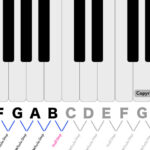Have you ever stumbled across a captivating chord while playing your guitar, but found yourself stumped when trying to name it? It’s a common scenario for guitarists of all levels. Instead of getting lost in complex music theory or interrupting your creative flow, a Guitar Chord Finder can be your best friend. These handy online tools are designed to quickly identify chords, empowering you to understand and utilize new sounds in your playing.
What is a Guitar Chord Finder and Why Use One?
A guitar chord finder is essentially a reverse chord dictionary. Instead of searching for a chord name to see its finger positions, you input the notes you are playing, and the finder identifies the chord for you. This is incredibly useful in several situations:
- Identifying Unknown Chords: Like the original poster on guitarplayers.net, you might discover a chord by experimentation and need help naming it. A chord finder provides the answer instantly.
- Understanding Chord Variations: Chord finders can reveal alternative names and theoretical interpretations of the same chord voicing. The original poster’s example of D6/11sus and Bm7#5 perfectly illustrates this.
- Learning Chord Construction: By seeing the notes that make up a chord, you begin to understand how chords are built, which is a stepping stone to deeper music theory knowledge.
- Exploring New Sounds: Chord finders can encourage experimentation. Knowing you have a tool to identify unfamiliar chords makes it less daunting to explore new fingerings and sonic territories on your guitar.
Key Features of a Helpful Guitar Chord Finder
While there are many guitar chord finders online, some features make certain tools more effective than others. Based on the original post’s positive experience with scales-chords.com, and general best practices, here are key aspects to look for:
- Note Input Flexibility: The ability to input notes in various ways is crucial. Scales-chords.com allows you to “check off the notes,” which is user-friendly. Other finders might offer virtual fretboards or note selection from a list.
- Comprehensive Chord Recognition: A good finder should recognize a wide range of chords, from basic triads to more complex extended and altered chords.
- Multiple Naming Options: As seen with the D6/11sus/Bm7#5 example, chords can sometimes have multiple valid names depending on context and theoretical interpretation. A helpful finder might offer these alternatives.
- Ukulele and Other Instrument Support: The original post mentions the scales-chords.com tool also showing ukulele chord fingerings. This is a bonus for multi-instrumentalists or those exploring ukulele as well.
- User-Friendly Interface: The tool should be intuitive and easy to navigate, allowing you to quickly get the information you need without a steep learning curve.
Discovering New Chords and Variations: Embrace Experimentation
The original poster’s journey of finding a D6/11sus chord and their appreciation for ukulele’s role in chord discovery highlights a crucial aspect of musical growth: experimentation. A guitar chord finder empowers this process. You can:
- Experiment on your guitar: Try moving fingers around familiar chord shapes, adding or removing fingers, and see what new sounds emerge. Then, use the chord finder to identify them.
- Translate ukulele discoveries to guitar: The poster noted finding chords on ukulele they wouldn’t have found on guitar. If you play ukulele, explore its fretboard and then use a chord finder to identify these shapes, and see if they translate to interesting guitar chords.
By combining experimentation with a reliable guitar chord finder, you can unlock a world of new sonic possibilities and deepen your understanding of the guitar.
Beyond Chord Naming: A Gateway to Music Theory
While a guitar chord finder is a practical tool for immediate chord identification, it can also be a stepping stone to broader music theory understanding. As you use the finder and see the note構成 of various chords, you’ll naturally start to recognize patterns and relationships between chords. This can spark an interest in learning more about music theory, chord progressions, and harmony, ultimately making you a more versatile and knowledgeable guitarist.
In conclusion, a guitar chord finder is an invaluable tool for any guitarist seeking to expand their chord vocabulary, understand music theory, and unlock new creative avenues. Whether you’re a beginner just starting to explore chords or an experienced player looking for fresh inspiration, a reliable chord finder like the one mentioned at scales-chords.com can be a game-changer in your musical journey.

